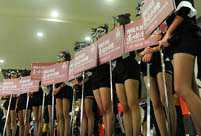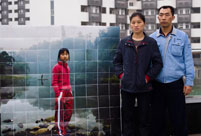PRETORIA, Oct. 29 -- Agriculture ministers from BRICS countries met here on Tuesday to address the negative effects of climate change on world food security.
The gathering, the 3rd of its kind, will culminate in the signing of a joint declaration which will demonstrate BRICS' determination to meet the challenges confronting food security.
"We are required to ensure that the decisions we make today impact positively on the continent and the quality of the land we leave for the next generation and their children," South African Agriculture, Forestry and Fisheries Minister Tina Joemat- Pettersson said at the conference.
"It is my expectation that we will emerge from this meeting with a shared sense that it was instructive, successful and well worth of the investment and effort we have made to be here."
Food security is a huge challenge and thus a key priority for the African continent, said Joemat-Pettersson.
She said the meeting will consider and provide leadership on the important matters related to food security.
"Our priority on the continent and in South Africa is to promote sustainable agricultural and food production, which will enable Africa to feed itself and the world," the minister said.
She urged BRICS countries to urgently and significantly accelerate agricultural and food production, so that people on the continent can enjoy sustainable access to safe, nutritious and affordable food.
BRICS ministers must promote smart, responsible and sustainable agriculture, the minister stressed.
BRICS is an acronym for world's major emerging markets, namely Brazil, Russia, India, China and South Africa.
"As we consider 'Negative Effect of Climate Change on World Food Security', we must remain mindful that, with few exceptions rural women fare worse than rural men and urban men and women against all the Millennium Development Goals indicators," Joemat- Pettersson said.
This includes areas such as diverse as agriculture, health, education, paid and unpaid work and social protection.
Research has shown that closing the gap in terms of access to resources and support for women in the agricultural sector makes good economic sense, the minister said.
It has been estimated that if women had the same access to productive resources (such as land ownership, technical inputs, water and energy) as men, they could increase yields on their farms by 20 percent to 30 percent and that this would raise the agricultural output in developing countries by 2.5 to four percent and reduce the number of hungry people in the world by between 12 percent to 17 percent, according to Joemat-Pettersson.
 Annual airshow kicks off in Houston
Annual airshow kicks off in Houston U.S. Navy Carrier Strike Group stages military exercises
U.S. Navy Carrier Strike Group stages military exercises Volkswagen showcases new energy vehicles in Beijing
Volkswagen showcases new energy vehicles in Beijing  Different eye catching shows at housing fairs in China
Different eye catching shows at housing fairs in China Special family portraits call attention to left-behind children
Special family portraits call attention to left-behind children Migrant children’s pain and joy in city
Migrant children’s pain and joy in city Lingerie show dazzles Wuhan Motor Show 2013
Lingerie show dazzles Wuhan Motor Show 2013  Running in fun customs at Beijing Int'l Marathon
Running in fun customs at Beijing Int'l Marathon  Weekly Sports Photos
Weekly Sports Photos Unveil PLA air force base
Unveil PLA air force base  World has never been dark-- a blind kid’s life in Tibet
World has never been dark-- a blind kid’s life in Tibet Oriental education or western education?
Oriental education or western education? China in autumn: Kingdom of red and golden
China in autumn: Kingdom of red and golden Pet costume competition
Pet costume competition Chinese screen goddesses from Beijing Film Academy
Chinese screen goddesses from Beijing Film Academy Day|Week|Month